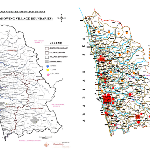Please find below the
Finalist Evaluation
Judges'' comments
SUBJECT: Climate CoLab Judging Results
Proposal: Sustainable habitat assessment planning evaluation &Design: Development criteria
Thank you for participating in the 2015 Climate CoLab rural resilience contest, and for the time you spent in creating and revising your entry.
The Judges have strongly considered your proposal in this second round of evaluation, and have chosen to not advance it as a Finalist for this contest.
We, the Judges and contest Fellows, are truly grateful for your contribution to the Climate CoLab and for your commitment to address climate change.
We encourage you to keep developing your work. Transfer it to the Proposal Workspace to re-open it, make edits, add collaborators, and even submit it into a future contest. You can do so by logging into your account, opening your proposal, selecting the Admin tab, and clicking “Move proposal”.
We hope you will stay involved in the Climate CoLab community. Please support and comment on proposals that have been named Finalists and vote for which proposal you would like to be nominated as the contest’s Popular Choice Winner.
If you have questions, please contact the Climate CoLab staff at admin@climatecolab.org
Keep up the great work. And thank you again for being a part of this mission to harness the world’s collective efforts to develop and share innovative climate change solutions.
2015 Climate CoLab Judges
Comment 1:
The simultaneous use and integration of sociological and biochemical research is innovative and potentially very powerful. The area to be studied is apparently being subjected to increasing industrial impacts with inadequate evaluation of consequences and potential alternatives. The most interesting aspects of this proposal are cross-disciplinary. Given the potential impacts of tracking the relatively invisible chemical human footprint across a large territory, the investment of upwards of half a million dollars to create a laboratory and documentary capacity seems well-considered. The most crucial aspects of the project will be revealed during the publication phase. Unfortunately, most of this activity is several years out, with many hurdles to be overcome in the early years. The project's promoters must develop more direct and clear language to convey the importance of tracking these hidden markers of human development. I would like to see an accessible and popular narrative developed along with the scientific data so that a sense of the historic importance of current changes can be readily grasped. As Udupi town is located at an elevation of only 10m above sea level, it seems likely that climate-induced sea level rises and storms will have a major impact during this century, but the project does not make much reference to them.
The links with climate-driven changes in environment are less well developed in this proposal than would seem to be warranted by the contest challenge.
Comment 2:
Strengths: Adopts an intergrative approach to enable better scientific knowledge to support rural resilience. Additional benefits from improving technical resources in the locality and create opportunities for supplementary commercial activity.
The proposal could more clearly explain how the various scientific studies will lead to social and policy actions that increase rural resilience. The proposal is ambitious organizationally and technically, which increases risks of non-delivery.
Semi-Finalist Evaluation
Judges'' ratings
| • | Novelty: | |
| • | Feasibility: | |
| • | Impact: | |
| • | Presentation: |
Judges'' comments
Semi-Finalist - Advance
SUBJECT: Your proposal has been selected as a Semi-Finalist!
Congratulations! Your proposal, Sustainable habitat assessment planning evaluation &Design: Development criteria in the Rural resilience contest, has been selected to advance to the Semi-Finalists round.
You will be able to revise your proposal and add new collaborators if you wish, from July 1st until July 14, 2015 at 23:59pm Eastern Time.
Judges' feedback are posted under the "Evaluation" tab of your proposal. Please incorporate this feedback in your revisions, or your proposal may not be advanced to the Finalists round. We ask you to also summarize the changes that you made in the comment section of the Evaluation tab.
At the revision deadline listed below, your proposal will be locked and considered in final form. The Judges will undergo another round of evaluation to ensure that Semi-Finalist proposals have addressed the feedback given, and select which proposals will continue to the Finalists round. Finalists are eligible for the contest’s Judges Choice award, as well as for public voting to select the contest’s Popular Choice award.
Thank you for your great work and again, congratulations!
2015 Climate CoLab Judges
This is a strong and detailed proposal that would harness scientific research and analysis to support resource management and sustainable development. The proposal is generally very clearly presented and is well prepared and researched. As such, I am persuaded of its feasibility though I have some questions about the accommodation to house the equipment and training for technicians and managers. The volume of work to be untaken is also unclear, and as such it might be possible that the analyses required could be sub-contracted commercially for less than the cost of investing in an ICP-MS and other resources. However, although not directly stated in the proposal, purchase of an ICP-MS could itself offer benefits in creating good quality scientific resources and could itself be used for commercial work earning an income that could help to sustain this project in the long term. The analysis of local habitats in this way has been undertaken in a number of western countries, but could be especially valuable in a context such as India. Moreover, the use of this knowledge of the habitat to guide subsequent development plans is consistent with current ideas of sustainable development.
 Deepika Shetty Jul 14, 2015 12:10 | Proposal creator
The judges’ comments have been very encouraging. I have added the map of the area to be surveyed and population distribution as the icon of the project to explain the extent of the work involved. Also this set up would be developed through the project as an independent research and consultancy lab with the support of the university to do such works and will have independent identity. This set up would relate to regional appraisal as well as defining related design proposal master-plans. The university has around 50 academicians with architecture, planning and product design background and over 750-800 students of graduate and post graduate studies in architecture and urban design. The constant interaction between academics and research would be mutually beneficial and practical. This would also make the consultancy politically neutral, fair and socially beneficial.
|
 Deepika Shetty Jul 14, 2015 12:37 | Proposal creator
the ICP-MS set-up and the GIS evaluation set-up would be doing independent consultancy for other projects and there are trained personnels already in the faculty of architecture in Manipal university. There are Geo-scientists from civil department and IT professionals from it department of the university for any help regarding this subject.
|
